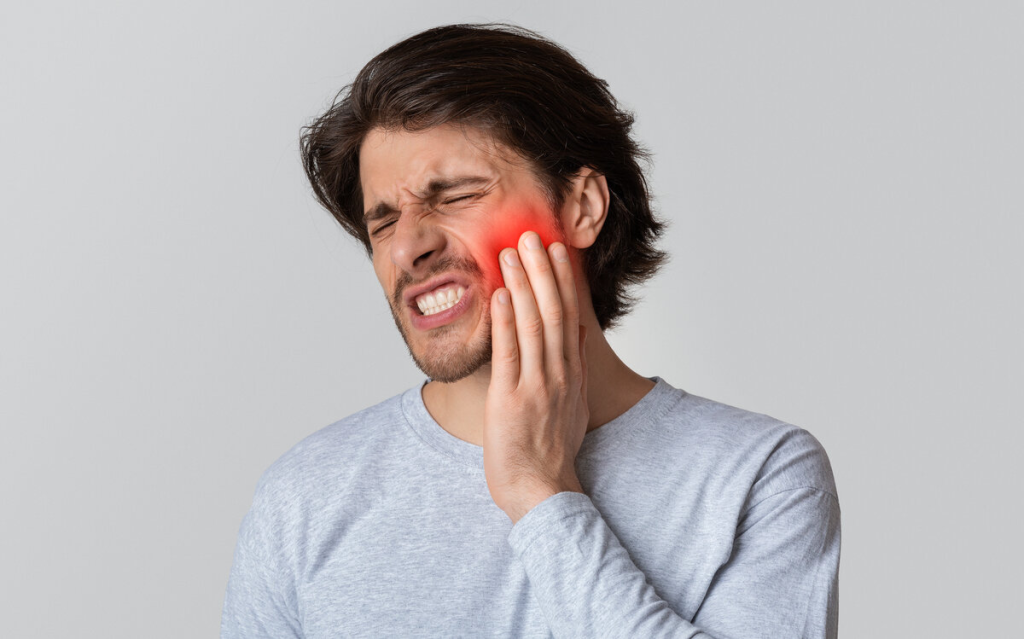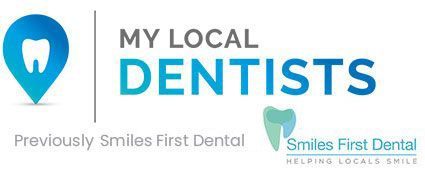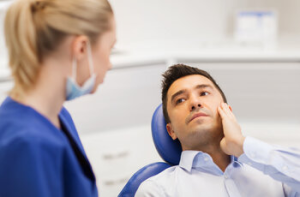Severe Tooth Pain: Causes, Symptoms, and Treatment Options

Tooth pain can be incredibly bothersome and disruptive, particularly when it strikes suddenly and intensely.
It frequently serves as an indicator of underlying dental issues that demand prompt attention and treatment.
Therefore, seeking immediate dental care from your dentist is crucial when faced with severe tooth pain.
In this article, we will explore some prevalent reasons behind such pain and explore the appropriate remedies to address them effectively.
Causes of Severe Tooth Pain
Cavities (Tooth Decay):
Tooth decay, commonly known as cavities, is a prevalent dental problem caused by the interaction between oral bacteria and sugars in our foods.
The bacteria produce acids that gradually eat away at the protective outer layer of the teeth, known as enamel.
As the enamel weakens, small holes, or cavities, form in the affected teeth.
Initially, cavities may not cause significant discomfort, but as they progress and reach the dentin (the sensitive layer beneath the enamel), they can lead to intense tooth pain.
Gum Disease:
Gum disease, or periodontal disease, is a bacterial infection that affects the tissues supporting the teeth, including the gums, periodontal ligaments, and alveolar bone.
It typically starts with the buildup of plaque, a sticky film of bacteria that forms on the teeth’s surface.
When plaque is not adequately removed through brushing and flossing, it hardens into tartar (calculus), which irritates the gum tissue, causing inflammation and swelling.
In the early stage, gum disease is known as gingivitis, and it may cause mild gum tenderness and bleed during brushing or flossing.
However, if left untreated, the infection can progress to more severe forms of gum disease.
In advanced stages, the gums may recede, exposing the tooth roots and increasing tooth sensitivity and pain.
As gum disease advances, it can also destroy the bone supporting the teeth, leading to tooth mobility and potential tooth loss.
Severe gum disease may require extensive dental treatments such as deep cleaning (scaling and root planing), antibiotics, or surgical intervention.
Good oral hygiene, including regular brushing, flossing, and antibacterial mouthwash, can help prevent gum disease.
Additionally, visiting your dentist for regular checkups allows early detection and prompt treatment of gum-related issues.
Tooth Abscesses:
A tooth abscess is a pocket of pus that forms due to a bacterial infection, typically within the tooth’s root or between the tooth and the gum.
The infection can result from untreated cavities, cracked teeth, or severe gum disease.
Tooth abscesses cause intense and persistent toothache, often described as throbbing and sharp.
The pain may radiate to the jaw, ear, or neck. Other symptoms include swelling of the face or gums, redness, and tenderness.
Sometimes, a small pimple-like bump (known as a fistula) may appear on the gum near the affected tooth, which can discharge pus.
A tooth abscess requires immediate dental attention, as the infection can spread to other body parts and lead to serious complications.
Treatment usually involves draining the abscess through root canal therapy or tooth extraction, along with antibiotics to eliminate the infection.
Tooth Fractures:
A tooth fracture occurs when a tooth’s structure is compromised due to external trauma, such as accidents, sports injuries, or biting down on hard objects.
The severity of the fracture can vary, ranging from minor cracks in the enamel to more significant fractures that extend into the tooth’s root or below the gumline.
Symptoms of a tooth fracture include sharp pain when biting or chewing, sensitivity to temperature changes, and discomfort when the affected tooth is exposed to sweet, sour, or cold foods and beverages.
The pain may come and go, making it challenging to identify the exact cause without a dental examination.
Treatment for tooth fractures depends on the extent of the damage. Minor fractures can often be repaired with dental bonding or a dental crown.
More severe fractures may require root canal therapy to remove the damaged pulp and stabilise the tooth. In some cases, if the tooth is beyond repair, extraction might be necessary.
Preventing tooth fractures involves avoiding habits like biting on hard objects, wearing a mouthguard during sports activities, and seeking treatment for teeth grinding (bruxism) to protect the teeth from excessive force.
Cracked Tooth:
A cracked tooth is a specific type of tooth fracture that involves a visible crack or line on the tooth’s surface.
It can occur for various reasons, such as dental trauma, biting down on hard objects, or even underlying tooth weakening from large fillings or root canal treatment.
Cracked teeth can cause severe pain, especially when chewing or exposed to temperature changes.
The pain may be sporadic and difficult to pinpoint, making it crucial to visit a dentist for a proper diagnosis and treatment.
Depending on the extent and location of the crack, treatment options may include dental bonding, a dental crown, root canal therapy, or, in severe cases, tooth extraction.
Tooth Trauma:
Tooth trauma refers to any injury or impact to the mouth that affects the teeth, surrounding tissues, or supporting structures. This can happen due to accidents, falls, sports injuries, or other external trauma.
Depending on the force of the impact, tooth trauma can result in various conditions, such as tooth fractures, dislodged teeth (avulsion), or injuries to the gums and jawbone.
Tooth trauma often leads to severe tooth pain and sensitivity, and it is crucial to seek immediate dental care to assess the extent of the damage and determine the appropriate treatment.
Treatment for tooth trauma will depend on the specific injury and may include repositioning and stabilising dislodged teeth, splinting, root canal therapy, or dental restorations to repair fractured teeth.
Symptoms of Severe Tooth Pain:
Sharp, Stabbing Pain:
One of the hallmark symptoms of severe tooth pain is sharp and stabbing discomfort localised to the affected tooth or the surrounding area.
This type of pain is often intense and sudden, and it may be triggered by various stimuli, such as biting down on the tooth, applying pressure, or consuming hot or cold foods and drinks.
Throbbing Pain:
Another common symptom of severe tooth pain is throbbing pain. This type of pain is characterised by rhythmic pulsations or a steady, persistent ache that can radiate to other parts of the face, jaw, or ear.
The throbbing pain is often associated with dental infections, such as tooth abscesses, and can worsen when lying down or during periods of increased blood flow.
Prolonged Sensitivity to Hot or Cold Temperatures:
Severe tooth pain can be accompanied by heightened sensitivity to hot or cold temperatures.
The affected tooth may react strongly to the thermal changes, causing a sharp, shooting pain that lingers after removing the stimulus.
This sensitivity can make eating or drinking hot or cold foods and beverages uncomfortable.
Pain When Chewing:
When experiencing severe tooth pain, chewing or biting the affected tooth can exacerbate the discomfort.
The pressure exerted during chewing can trigger sharp pain or cause a continuous ache, making it challenging to eat or chew on that side of the mouth.
It’s essential to note that the symptoms of severe tooth pain may vary depending on the underlying cause, such as cavities, gum disease, tooth abscesses, tooth fractures, or tooth trauma.
Additionally, the pain’s intensity and other accompanying symptoms may provide valuable clues to help diagnose the specific dental issue.
Treatment Options for Severe Tooth Pain:
Over-the-Counter Pain Relievers:
For temporary relief of severe tooth pain, over-the-counter pain relievers can be used.
Common options include nonsteroidal anti-inflammatory drugs (NSAIDs) like ibuprofen or acetaminophen.
These medications can help reduce inflammation and alleviate pain.
However, following the recommended dosage and consulting a healthcare professional if the pain persists or worsens is essential.
Prescription Medication:
A dentist may prescribe stronger pain relievers in cases of more severe tooth pain or when over-the-counter medications are insufficient.
These may include stronger NSAIDs or other pain medications to manage acute pain effectively.
Root Canal Therapy:
Root canal therapy is a common dental procedure to alleviate severe tooth pain caused by infected or damaged dental pulp (the soft tissue inside the tooth containing nerves and blood vessels).
During the procedure, the dentist removes the infected pulp, cleans the root canals, and seals the tooth to prevent further infection.
Root canal therapy helps preserve the natural tooth and can significantly relieve tooth pain.
Extraction:
In cases where the tooth is severely damaged, or the surrounding structures are beyond repair, tooth extraction may be necessary to eliminate severe tooth pain.
Tooth extraction involves removing the affected tooth from its socket.
After extraction, the dentist may recommend various tooth replacement options, such as dental implants, bridges, or dentures, to restore function and aesthetics.
The treatment choice for severe tooth pain depends on the specific dental issue causing the pain, the extent of the damage, and the overall condition of the affected tooth and surrounding tissues.
Dentists will assess the situation, perform diagnostic tests, and recommend the most appropriate treatment option to address the underlying cause of the pain effectively.
Conclusion
Ignoring severe tooth pain is not advisable, as it often indicates an underlying dental problem that requires professional treatment.
Dental issues such as decay, gum disease, or trauma can lead to intense tooth pain. Seeking relief for severe tooth pain is crucial, as it can be a warning sign of more significant dental and overall health issues.
Regular dental checkups every six months are essential to maintain good oral health and prevent tooth pain.
Prevention is always better than cure when it comes to dental problems. Contact our professional and experienced dentists at My Local Dentists Northmead to receive the best advice and treatment for any tooth pain you may be experiencing. Don’t delay seeking dental care to address tooth pain and ensure a healthy smile.
References:
Oral Analgesics for Acute Dental Pain https://www.ada.org/resources/research/science-and-research-institute/oral-health-topics/oral-analgesics-for-acute-dental-pain
Antibiotics for Dental Pain and Swelling Guideline (2019) https://www.ada.org/resources/research/science-and-research-institute/evidence-based-dental-research/antibiotics-for-dental-pain-and-swelling


